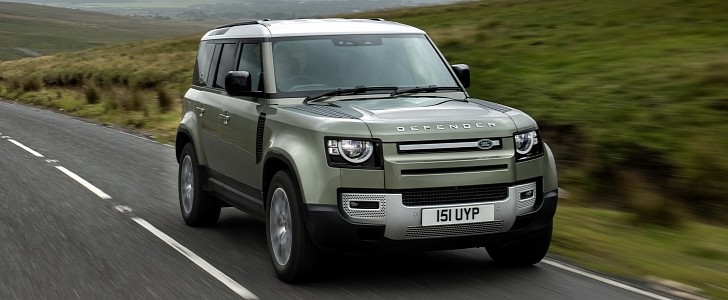Jaguar Land Rover believes that a zero-emissions tailpipe future can include both battery-electric vehicles as well as hydrogen fuel cell-powered ones. In order to explore this further, they’re planning on developing a hydrogen fuel cell electric concept based on the new Land Rover Defender, with testing scheduled to begin this year.
JLR is aiming to achieve zero tailpipe emissions by 2036, and go net zero carbon emissions across its entire supply chain, products and operations by 2039, as per their Reimagine strategy.
The new Defender FCEV concept will take to UK roads in order to verify key attributes such as off-road capability and of course, fuel consumption. For its development, JLR will work together with several world class R&D partners, including Delta Motorsport, AVL, Marelli Automotive Systems and the UK Battery Industrialization Center (UKBIC).
The benefits with hydrogen-powered FCEVs include high energy density and rapid refueling, as well as minimal loss of range in low temperatures, which can be an issue with BEVs in general. This also means that FCEVs could thrive as larger, longer-range vehicles, or ones that need to function in very hot or very cold climates.
Around the world, the number of hydrogen fuel cell cars has nearly doubled since 2018, while hydrogen refueling stations have increased by more than 20%. Meanwhile, some predict that hydrogen-powered FCEV deployment could top 10 million units by 2030, to go with 10,000 refueling stations worldwide.
According to JLR’s head of hydrogen and fuel cells, Ralph Clague, his company knows that hydrogen “has a role play in the future powertrain mix across the whole transport industry,” and that there’s plenty of room for FCEVs alongside battery electric vehicles.
It will certainly be interesting to see what JLR is able to accomplish through this project and whether people can be talked into embracing hydrogen fuel cell technology to the same extent as they have battery electric vehicles – which took some convincing.
The new Defender FCEV concept will take to UK roads in order to verify key attributes such as off-road capability and of course, fuel consumption. For its development, JLR will work together with several world class R&D partners, including Delta Motorsport, AVL, Marelli Automotive Systems and the UK Battery Industrialization Center (UKBIC).
The benefits with hydrogen-powered FCEVs include high energy density and rapid refueling, as well as minimal loss of range in low temperatures, which can be an issue with BEVs in general. This also means that FCEVs could thrive as larger, longer-range vehicles, or ones that need to function in very hot or very cold climates.
Around the world, the number of hydrogen fuel cell cars has nearly doubled since 2018, while hydrogen refueling stations have increased by more than 20%. Meanwhile, some predict that hydrogen-powered FCEV deployment could top 10 million units by 2030, to go with 10,000 refueling stations worldwide.
According to JLR’s head of hydrogen and fuel cells, Ralph Clague, his company knows that hydrogen “has a role play in the future powertrain mix across the whole transport industry,” and that there’s plenty of room for FCEVs alongside battery electric vehicles.
It will certainly be interesting to see what JLR is able to accomplish through this project and whether people can be talked into embracing hydrogen fuel cell technology to the same extent as they have battery electric vehicles – which took some convincing.








